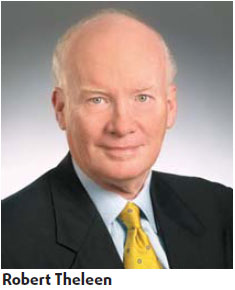

Thirty-two years ago when Robert Theleen first came to the mainland to speak with senior Beijing officials curious about the Western financial system, he had no idea he would become the first venture capitalist on the mainland, managing and investing almost half a billion dollars in more than 60 companies on the mainland.
At the time Theleen was a Hong Kong-based petroleum finance banker. George Bush, then the first US ambassador to China, invited Theleen to give a lecture to a group of mainland officials interested in facilitating the country's economic reform.
In 1976 it was against Chinese law for foreigners to talk openly about capitalism on the mainland. Theleen still remembers the stony stares given by the officials wearing Mao suits as he was taken to a secret location to deliver his speech about petroleum, finance and Western banking.
At the end of the lecture the officials gave him a Chinese carpet. They said it was not really a gift, but his new cover job.
"Are you making me a spy?" Theleen asks.

No, according to them, the only way to get a visa to come back to China is if they give you a job. So now you are a Chinese carpet merchant.
Theleen's progress from "carpet merchant" to venture capitalist was almost accidental. Petroleum was the first major foreign industry to open up in China. Theleen used his background to develop relations with petroleum administrators and worked on many projects. From 1980 to 1982, he ran a small consulting business on the mainland. During the two years he was struck by the country's need for capital.
"China was desperate for capital, so why wouldn't we start a small investment company?"
Theleen set up his China-focused private equity fund, China Vest, in 1981. Initially he cast his sight on entrepreneurs from Hong Kong and Taiwan since there was no hi-tech industry on the mainland.
"Our first fund was only $20 million and all the investors were from Europe. We put bets on some small export-oriented manufacturing businesses on the mainland, too," he says, adding that every three or four years, they took these manufacturing companies public in Hong Kong, making good returns.
In 1980s many Chinese still believed doing business with foreigners was dangerous, although Deng Xiaoping had defined his cat theories. Like many other novel concepts that sprang up in China over the past 30 years, venture capitalists such as Theleen initially met with skepticism and mistrust.
"Chinese people had no concept of ownership, and they didn't understand the idea of owning something privately, let alone venture capital," Theleen says.
"Many Chinese entrepreneurs doubted what seemed a too-good-to-be-true deal," he adds. They wondered why someone would give money, ask only for a minority stake, promise to cash out some time and not be fussy about dividends.
"My Chinese partners put a notice on my office door reading 'if you cheat us, we may go to prison forever'," Theleen recalls.
But doubt dissipated as China Vest's success grew. In 1997 Zindart Manufacturing Ltd (in which China Vest had invested $12 million four years earlier) became the first mainland company listed on NASDAQ.
Theleen sensed an increase in domestic consumption and, in the mid-1990s, China Vest, moved away from labor-intensive industries and started investing in companies that focused on logistics, infrastructure and catering, instead.
"After we brought T.G.I. Friday's, the first American causal dining chain, to Beijing, casual dinning became a symbol of a new lifestyle," Theleen says, with a sparkle in his eye.
Although China was still labeled a manufacturing powerhouse, investors spent heavily in a bid to cultivate hi-tech enterprises. Charles Zhang, founder and chairman of Sohu.com, and Robin Li, founder of Baidu.com, were poster children of the ensuing venture investment boom and became business idols to Chinese college students. Their successes fostered interest in science and technology among many young people, who dreamt of becoming millionaires overnight. Consequently there are now Chinese versions of Ebay, Amazon and other Internet mainstays.
"China became a paradise for venture investors," says Andy Yan, founding partner of SAIF Partners. "The nation's continual push to restructure its State-owned sector will offer great opportunities for venture capitalists and private equity investors."
The nation's booming economy and rising consumer market offer lucrative investment opportunities for international capital. Venture capitalists spent $325 billion on local start-ups in 2007, up 82.7 percent compared with a year ago, according to Zero2ipo, a researcher on China's venture capital sector.
But, according to Theleen, focusing solely on China's successful Internet companies makes for a "narrow focus" of the new China.
"We know the real China. We have broader focus," he says. "I care more about what real Chinese read, eat, drink, wear and use. Consumption is the reality."
Domestic consumption is made more crucial by the current financial crisis, which could curtail export-oriented businesses, he said.
"China must develop its own marketplace and a stronger domestic consumer economy which will be less reliant on low-margin exports," he says.
China Vest's new business target - "Mrs Wang's purse" - highlights the company's focus on Chinese consumers. Theleen explained the symbolic "Mrs Wang" is an intelligent, university-educated woman who lives in a city with a good job, high income and a purse full of money she spends on her family and herself.
"Indeed 'Mrs Wang's purse' can be seen as a form of economic democracy where the use of money amounts to a type of voting," Theleen says. "My 'Mrs Wang' will be the key to a growing and thriving consumer economy."
(China Daily 12/15/2008 page7)













